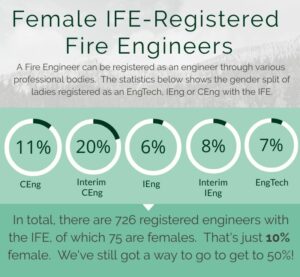
Women in Fire Engineering
On International Women’s Day, Parina reflects on her experiences as a woman in fire engineering.
Earlier this year I was fortunate enough to present a session at the inaugural Institution of Fire Engineers (IFE) Women in Fire Engineering Networking Group. Putting together my slides gave me the opportunity to have a real think about my experiences in fire engineering.
Around the same time, the IFE published data on their gender split which outlined that of the 726 engineers registered with the IFE, only 75 (just over 10%) identify as female. While this was disappointing to hear, it was reassuring to find out that 11% of Chartered Engineers and 20% of interim Chartered Engineers identify as female which is really positive going forward. Especially considering that the average age of the 11,231 members of the IFE is eight years less for members who identify as female (40 years old) than those who identify as male (48 years old).
I have plenty of experience in male-dominated workplaces. It’s been almost 20 years since I first walked into an A Level chemistry class where I was the only female. Over time, the impact of being ‘the only’ in the room can lessen. For me, it had lessened to a point where, I’m ashamed to say, I’d stopped noticing. That doesn’t make it right.
It was a comment made by a junior engineer that stopped me in my tracks. They had noticed that the current edition of the IFE quarterly journal didn’t include a single image (stock, or otherwise) of a woman. I’d flicked through the same edition and had failed to notice.
It was following on from this that I decided I needed to make myself more visible as a woman in fire engineering and that is how I ended up agreeing to give a presentation to the Women in Fire Engineering Networking Group (WIFENG).
During my presentation I spoke quite openly about my experiences as a woman in fire engineering. I spoke about overt sexism (yes, it still happens) and having to regularly call out the microagressions and unconscious bias that exist throughout our industry. How I’m often referred to as ‘Mr Patel’ (it’s Dr Patel, actually), or it’s assumed that despite being with a more junior male colleague I’m only attending a meeting to take notes. I commented on the language that women have been conditioned by wider society to use when communicating and how it impacts on their perceived levels of confidence in the workplace.
It was interesting to hear that everyone at the session had similar experiences. All of them.
What surprised me about the session and the WIFENG in general is the amount of support that individuals provide to each other. The mere fact that there is a forum where we could speak up and share our stories is something I’d never experienced before. Working in male-dominated environments means that opportunities like these don’t tend to come up in the workplace. One of the session members mentioned that not only are they the only female in their team, they’re also the only engineer.
The amount of support available to female fire engineers is unprecedented. Both the IFE and the Society for Fire Protection Engineers (SFPE) have networking groups specifically for women and LinkedIn provides a great platform for like-minded individuals to connect. It was reassuring to see the number of early careers engineers who were in attendance; the industry is definitely changing and I’m positive for the future, but the statistics are still against women in all fields of engineering.
Based on research by the Royal Academy of Engineering, 57% of female engineers drop off the register before the age of 45. To address this, we need to create an environment where women feel welcome, stay, and prosper. There is a growing body of evidence which suggests that the main reason women leave engineering is due to gender bias.
This year’s theme for International Women’s Day is #BreakTheBias.
I invite you all to inform yourselves on the microagressions women face in the workplace. Educate your staff. Talk to each other. And when these situations arise, call out the bias. It shouldn’t just be down to women to do this; we are a minority, and we are relying on our (often more senior) male colleagues to support us.
When I spoke at the WIFENG session about my experiences of calling out microaggressions, I was told I was brave. I don’t see it that way. I believe I don’t have a choice. I do it for the female engineering graduates embarking on their first work placement or job, already fed up with being given gendered roles when undertaking group work. I do it for the experienced female engineer walking into their Chartered Engineer interview to be faced with a ‘manel’. I do it for my one year old daughter who loves stacking blocks and playing with cars but can’t call out bias because her vocabulary is limited to ‘sock’ and ‘banana’.
As engineers we hugely influence the environment around us. How can meaningful discussions take place and decisions be made which are representative of the needs of broader society when a single demographic dominates?
- Posted by Parina Patel
- On 8th March 2022





0 Comments